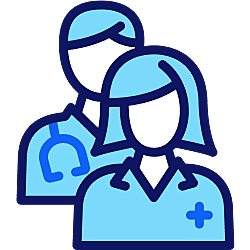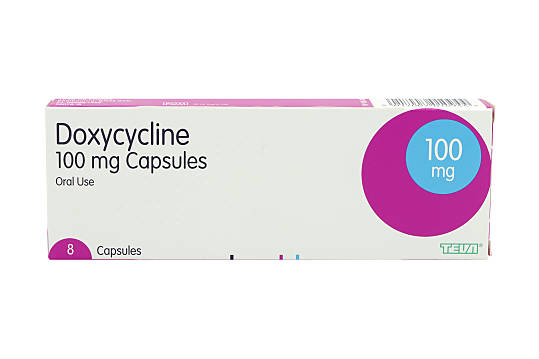Chlamydia Tablets
Request prescription antibiotics online to treat chlamydia, quickly and discreetly. Your medication is posted to you via free home delivery.
Prices from £18.00
Simply fill in a brief consultation questionnaire and one of our doctors will review your request today.
If you or your partner have tested positive for chlamydia, you can request antibiotics for chlamydia through our website.
You can order treatment if either:
- you’ve had a positive test result for chlamydia using either a home test kit or clinic test
- a doctor has diagnosed you with chlamydia
- a sexual partner has told you they have chlamydia
Please do not order treatment for someone else.
The recommended treatment for chlamydia is doxycycline 100mg tablets, which should be taken twice daily for 7 days.
Need to get tested for chlamydia? Order a chlamydia test kit and test yourself from the comfort and privacy of your home. If your result is positive, you can return to us to request treatment (see above).
Chlamydia tablets (antibiotics)
In stock. Prices from £18.00
In stock. Prices from £18.00

No results found.
Please check your spelling or try another treatment name.



About chlamydia treatment
-
-
Chlamydia is a very common sexually transmitted infection (STI) that can be passed on through unprotected sex. It is caused by a bacteria called Chlamydia trachomatis that lives in semen and vaginal fluids. It can also be transmitted from an infected mother to her baby during childbirth.
You can get chlamydia:
- by having unprotected sex (vaginal, anal or oral)
- from skin to skin contact of your genitals with another person's
- from sharing unwashed sex toys or using them without a condom.
Chlamydia normally infects the genitals, but it can also infect the rectum, eyes or throat.
-
-
Chlamydia often has no symptoms, so many people do not know they have it. If you do get symptoms and are a woman, you may have:
- unusual discharge from your vagina or bottom
- pain in your stomach
- bleeding between periods or after sex
- pain or burning when peeing
If you have chlamydia and are a man, symptoms may include:
- unusual discharge from your penis or bottom
- pain and swelling in your testicles
- pain or burning when peeing
For more information on chlamydia symptoms in men or women, check out our relevant pages.
Does feeling pain when you urinate mean you have an STI?
Not necessarily – not all causes of painful urinating are STIs.
It can be a sign of some STIs, though – painful urinating is a symptom of some sexually transmitted infections (STIs), including:
- Chlamydia – other symptoms of chlamydia can include discharge, bleeding or spotting between periods, testicle pain, and pain when having sex. It’s important to remember that more than half of people infected with chlamydia never show symptoms at all
- Gonorrhoea – this infection can affect the vagina, penis, bum (anus), or throat. Other symptoms include discharge, bleeding or spotting between periods, unusually heavy periods, pain when having sex, testicular pain, and the urge to pee frequently. It’s important to remember that around half of women infected with gonorrhoea never show symptoms
Why do some STIs cause painful peeing? – painful urinating is caused by bacteria in the tube that carries urine (urethra). The bacteria causes inflammation and irritation around the area, which causes it to become very sensitive. Any aggravation to the area (such as urinating) will cause a feeling of pain. Most people describe a ‘burning’ or ‘stinging’ pain when they experience painful urination.
What makes it more likely you have an STI – several factors can make it more likely for someone to contract an STI:
- Recent change in sexual partner
- Having a high number of sexual partners
- Having oral, vaginal, or anal sex without wearing a condom
-
-
Chlamydia must be treated with chlamydia tablets, with the recommended treatment being a course of doxycycline. This is an antibiotic that comes in 100mg tablets. Doxycycline should be taken twice daily for a total of 7 days to treat chlamydia.
-
-
Doxycycline is the most effective chlamydia treatment. This study found that doxycycline was 100% effective at treating chlamydia, compared to azithromycin, which is another chlamydia antibiotic. Azithromycin is no longer recommended for the treatment of chlamydia because of bacterial resistance.
-
-
Yes, you’re at risk of catching and passing on chlamydia during treatment. You will still be contagious because not enough of the bacteria that causes chlamydia will have been killed off at this point.
You should avoid all sexual contact during treatment. This includes sex with a condom. If your partner has chlamydia too, wait until you both have finished treatment and are free of symptoms to have sex (either with or without a condom).
-
-
You cannot get chlamydia antibiotics over the counter, as they must be prescribed to you. Some pharmacies offer chlamydia testing and can prescribe antibiotics without seeing your GP. You can check if your local pharmacy has this facility online or by asking a pharmacist.
You can get chlamydia tablets through our website. You can also speak to your GP or visit your local sexual health (GUM) clinic.
-
-
If you have symptoms, they should start to get better after a few days of taking treatment. You need to finish the whole course of antibiotics to treat chlamydia. After 7 days of doxycycline, you can have sex again.
It is important that your sexual partners get tested and get treatment if they need it. If you take treatment and your sexual partner has chlamydia, you can catch it again. You should only have sex again once both of you have finished your treatment.
-
-
Chlamydia usually needs to be treated with antibiotics, as this can kill the bacteria that causes chlamydia. In some cases, your chlamydia symptoms may get better without treatment, but this does not mean you do not have chlamydia. You could still pass it on to sexual partners. It can also cause complications if chlamydia is left untreated, so it is always better to seek treatment.
-
-
When chlamydia is left untreated, it could cause some serious complications. In women, chlamydia can spread to the fallopian tubes, ovaries, and womb. This could cause pelvic inflammatory disease (PID), which can cause other serious problems such as infertility and persistent pain in the pelvis.
Leaving chlamydia untreated can also cause problems for an unborn baby, so you should get treatment straight away if you are pregnant or trying to get pregnant.
If you are a man and have untreated chlamydia, you may get inflamed testicles as the bacteria spreads to your testicles and the tubes that carry your sperm, potentially affecting future fertility. Untreated chlamydia can cause your urethra (the tube that carries urine out of your penis), eyes, or joints, to become inflamed (a common cause of sexually acquired reactive arthritis). Reactive arthritis can happen in men or women, but you are more likely to get it if you are a man.
-
-
Chlamydia tablets could cause some side effects, although this is different for each person that takes them. Most side effects should be mild and will go away once your treatment course is over. If you get side effects that bother you a lot or are serious, you should speak to your doctor or call 111.
Doxycycline has some very rare side effects that need medical treatment. You should call 999 or go to A&E straight away if you get:
- a serious allergic reaction, which can cause swelling in your mouth or face, difficulty breathing, and itching
- tinnitus, which is a buzzing or ringing in your ears
- a severe skin reaction, such as peeling, burning, or reddening
- a drug reaction with eosinophilia and systemic symptoms (DRESS), which can cause a skin rash, fever, and swollen lymph nodes
The common side effects of doxycycline include:
- headache
- sensitivity to sunlight
- increased pressure in the skull which can cause vision changes and severe headaches
- low blood pressure
- nausea or vomiting (feeling or being sick)
- shortness of breath
- increased heart rate
- hives
- inflammation of small blood vessels
- rash
Uncommon side effects of doxycycline include:
- vaginal infection
- heartburn
Rare side effects of doxycycline include:
- anxiety
- aches and pains in your muscles or joints
- changes in blood tests
- inflamed liver (hepatitis)
- flushing
- a decrease in appetite
- yeast infection around the genital or anus
- pseudomembranous colitis, which can cause severe and watery diarrhoea, cramps, and fever
- blood disorders, which can cause weakness, tiredness, and easy bruising
- porphyria, a sensitivity to sunlight which can cause stomach pains and inflammation of the nerves

Dr Babak Ashrafi Clinical Lead for Service Expansion
Accreditations: BSc, MBBS, MRCGP (2008)
Babak studied medicine at King’s College London and graduated in 2003, having also gained a bachelor’s degree in Physiology during his time there. He completed his general practice (GP) training in East London, where he worked for a number of years as a partner at a large inner-city GP practice. He completed the Royal College of GPs membership exam in 2007.
Meet our doctorsLast reviewed: 19 Jul 2022
-
Chlamydia, National Health Service [accessed June 2022]
-
Doxycycline 100mg, Patient Information Leaflet, EMC [accessed June 2022]
-
How and when to take doxycycline, National Health Service [accessed June 2022]
-
Chlamydia - uncomplicated genital, NICE/Clinical Knowledge Summaries [accessed June 2022]







